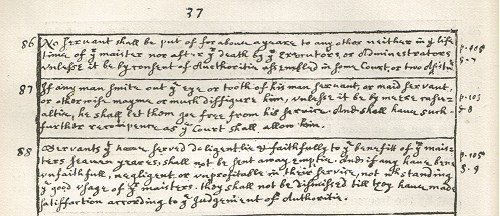Nathaniel Ward (1578–1652) wrote the first law code of the Massachusetts Bay Colony, which is considered to be one of the most important works in American constitutional history and a milestone in the American tradition of liberty. Yet, like John Cotton and other contemporaries, he also advocated a theocracy in which government would protect Puritan orthodoxy against heresy.
Ward was a Puritan minister in New England
Born in Haverhill, England, Ward graduated from Cambridge University in 1599, then practiced law for ten years as a barrister. He later entered the religious ministry and in 1628 became minister of a church in Essex, England. In 1633 he was criticized by the Bishop of London for espousing Puritan beliefs and was relieved of his church duties. Consequently, he immigrated to New England in 1634 and became the minister of a church in Ipswich, Massachusetts.
Ward was selected to write the Massachusetts Bay Colony law code
In 1636 Ward left the ministry because of poor health. Owing to his legal background, he was selected by the Massachusetts General Court, which served as the legislature for the Massachusetts Bay Colony, to write a code of laws for the newly founded colony. The court had previously received a draft of laws written by prominent Puritan minister John Cotton, but this draft was not adopted as the court felt that it relied too much on the Bible and not enough on English common law. The court turned to Ward for this task because he was considered one of the most well-educated legal figures in New England at that time.
Ward relied on English common law, the Magna Carta, and the Bible
In November 1639, Ward submitted his draft of the code, entitled “The Body of Liberties,” to the Massachusetts General Court. It contained nearly one hundred sections and was based in part on Cotton’s earlier draft. Like Cotton, Ward also relied heavily on the Bible in drafting the code. For example, one of the sections stipulated that the court should make no law that conflicted with biblical teachings. However, his draft also contained many principles drawn from the Magna Carta and English common law.
The draft ensured equal justice under the law and freedom from indiscriminate arrest and imprisonment. It also prohibited double jeopardy, cruel punishments, torture, and the confiscation of private property for the public good. Overall, the draft reflected Ward’s firm belief that justice and the law were necessary for individual freedom.
The code was the basis for the American tradition of liberty
The Massachusetts General Court enacted Ward’s code into law in 1641. It subsequently underwent several revisions and in 1648 became “The Laws and Liberties Concerning Inhabitants of Massachusetts.” This would be the basis for civil and criminal law throughout New England well into the eighteenth century and would serve as the basis for the American tradition of liberty.
Ward returned to England in 1648. He again took up the ministry, serving as a minister of a church in Essex. He wrote several books, including The Simple Cobbler of Aggawam (1647), which was a strong criticism of religious toleration, like that advocated by Roger Williams and later embodied in the establishment provision of the First Amendment. Alpheus Thomas Mason and Gordon E. Baker note that “[t]he state to Ward was the agent of the Church, its primary duty to insure the latter against attack by false religionists. No argument of natural rights and liberties, of popular sovereignty, or of natural law could prevail against his devout authoritarianism” (1985, 56).
This article was published by Gene C. Gerard in 2009.

